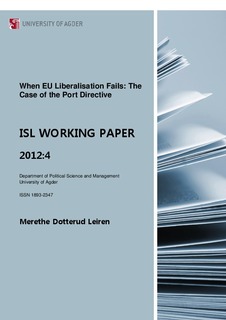| dc.contributor.author | Leiren, Merethe Dotterud | |
| dc.date.accessioned | 2012-04-25T09:18:26Z | |
| dc.date.available | 2012-04-25T09:18:26Z | |
| dc.date.issued | 2012 | |
| dc.identifier.issn | 1893-2347 | |
| dc.identifier.uri | http://hdl.handle.net/11250/139777 | |
| dc.description | Presentation on department page:
http://www.uia.no/no/portaler/om_universitetet/oekonomi_og_samfunnsvitenskap/statsvitenskap_og_ledelsesfag/
forskning_isl/isl_working_papers_series | |
| dc.description.abstract | The prevailing literature on European integration holds that asymmetries towards negative integration in the treaties are important for explaining increasing liberalisation reform in the EU. Additionally,literature on interest groups gives several reasons as to why labour unions are not likely to succeed at the EU level. However, to understand European integration, there is a need to also understand lack of integration. An in-depth analysis of the decision-making process of the EU Port Directive highlights the importance of actor constellations and inclusion of large societal groups such as labour unions in consultations. | no_NO |
| dc.language.iso | eng | no_NO |
| dc.publisher | Department of Political Science and Management, University of Agder | no_NO |
| dc.relation.ispartofseries | ISL Working Papers;2012:4 | |
| dc.title | When EU liberalisation fails: The case of the Port Directive | no_NO |
| dc.type | Working paper | no_NO |
| dc.subject.nsi | VDP::Social science: 200::Political science and organizational theory: 240::Public and private administration: 242 | no_NO |
| dc.subject.nsi | VDP::Social science: 200::Political science and organizational theory: 240::International politics: 243 | no_NO |
